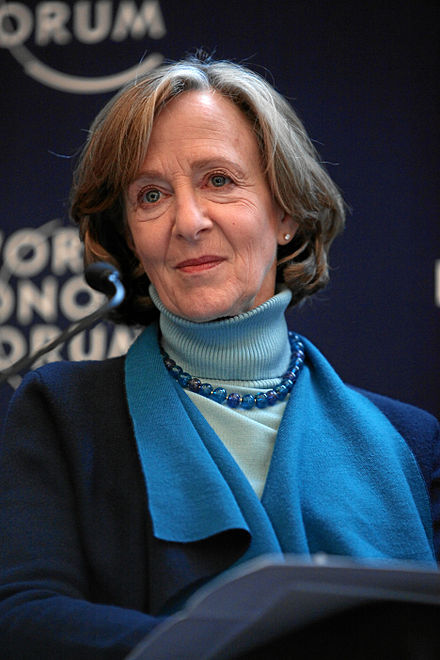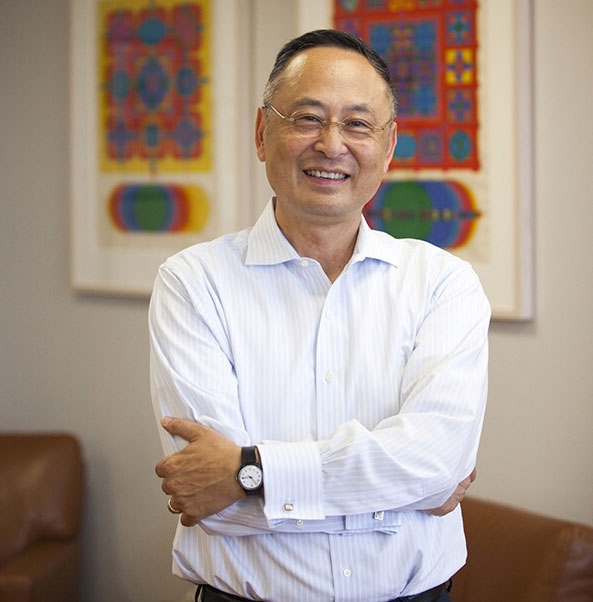Category: Leadership

He is the K. Frank Austen Professor of Medicine at Harvard Medical School and the associate chief of the Division of Rheumatology, Inflammation, and Immunity at Brigham and Women’s Hospital.
He is a member of the American Society for Clinical Investigation and the Association of American Physicians and serves on the Scientific Advisory Committee at the American College of Rheumatology. Before graduating from the medical scientist training program at the New York University School of Medicine, Anderson trained with Jan Vilcek, MD, PhD, the inventor of Remicaid, the first biologic therapy for patients with autoimmune disease. Anderson then came to the Brigham where he completed an internship and residency in Internal Medicine and a fellowship in Rheumatology. In 1990 he started his own research laboratory at the Brigham focusing on the role that post-transcriptional control of gene expression plays in the regulation of inflammatory and stress response programs. His laboratory has been funded by the NIH and by various foundations and industry collaborations, and has hosted more than 30 MD and/or PhD research fellows.
He has authored or co-authored more than 175 publications and is on the editorial boards of a number of journals, including Cellular Immunology and Modern Rheumatology. In addition, Anderson is a senior physician at the Brigham and sees patients in the Brigham arthritis ambulatory clinic and attends on the Rheumatology consult service. He is a member of the Rheumatology Division Fellowship Selection Committee, which interviews all applicants for the Rheumatology Fellowship Program and makes recommendations for ranking these candidates.
Anderson received a BS in Biology from SUNY Stony Brook, and received both MD and PhD (Microbiology) from New York University School of Medicine.
Allison Moriarty, MPH
Allison Moriarty, MPH is the Vice President of Research Administration and Compliance at the Brigham. She oversees compliance and ensures that all endeavors meet or exceed federal, state, and local regulations and other policy requirements. She is also responsible for oversight of research operations at the Brigham and Brigham and Women’s Faulkner Hospital, including building and maintaining the necessary infrastructure and resources to support the institutions’ research goals.

Susan Hockfield, PhD

Susan Hockfield is Professor of Neuroscience and President Emerita at the Massachusetts Institute of Technology; she served as the sixteenth president from 2004 to 2012, was the first woman and the first life scientist to lead the Institute. Prior to MIT, she was the William Edward Gilbert Professor of Neurobiology, Dean of the Graduate School of Arts and Sciences (1998-2002), and Provost (2003-2004) at Yale University.
After earning a BA in biology from the University of Rochester and a PhD from Georgetown University at the School of Medicine, Dr. Hockfield was an NIH postdoctoral fellow at the University of California at San Francisco. She then joined the scientific staff at the Cold Spring Harbor Laboratory in New York. In 1985, Dr. Hockfield became a faculty member at Yale University, where she focused her research on brain development and glioma, a deadly form of brain cancer, and also pioneered the use of monoclonal antibody technology in brain research.
Dr. Hockfield serves as president of the American Association for the Advancement of Science, a director of General Electric, Partners Healthcare System, and the Council on Foreign Relations, a life member of the MIT Corporation, a trustee of the Boston Symphony Orchestra, and a board member of the Belfer Center at the Harvard Kennedy School. She has served as co-chair of President Obama’s steering committee of the Advanced Manufacturing Partnership, a working coalition of academic, government and industry leaders, a member of a Congressional Commission evaluating the Department of Energy laboratories and as Science Envoy with the U.S. Department of State. Dr. Hockfield is the recipient of the Charles Judson Herrick Award from the American Association of Anatomists, the Wilbur Lucius Cross Award from Yale University, the Meliora Citation from the University of Rochester, the Golden Plate Award from the Academy of Achievement, the Amelia Earhart Award from the Women’s Union, the Edison Achievement Award, and the Pinnacle Award for Lifetime Achievement from the Greater Boston Chamber of Commerce. She has received honorary degrees from national and international universities, and is an elected fellow of the American Academy of Arts and Sciences and the American Association for the Advancement of Science.
Gerald Chan, PhD

Gerald Chan co-founded Morningside in 1986 as a private investment group with venture capital, private equity and property investments.
In the life science sector, Morningside focuses on start-up biotechnology companies founded on novel scientific discoveries. Notable investments in oncology that Gerald led include novel approaches to cancer therapeutics such as oncolytic viruses (BioVex, DNAtrix), immuno-oncology (Aduro), modified cytotoxic agents (Nucana), modified tumor microenvironment (Vigeo) and novel targets for therapeutic intervention (CellCentric). Investments in the infectious disease area include novel antibiotics (MicuRx, Artugen), prophylactic vaccines (Matrivax) and antivirals (Atea). Other investments cover the therapeutic areas of autoimmune diseases (Kezar), CNS disorders (Orthogonal, Pinteon, Cognito, Cognoa), and rare orphan diseases (Stealth, Apellis).
Gerald is a member of Harvard University’s Global Advisory Council, the Dean’s Board of Advisors of the Harvard T.H. Chan School of Public Health and the Harvard China Fund. He sits on the board of the Scripps Research Institute. He chairs the Overseers Committee of the Morningside College of Chinese University of Hong Kong and the Innovation Advisory Committee of the Wellcome Trust in UK.
Gerald received his BS and MS degrees in engineering from UCLA, his Master’s degree in medical radiological physics and Doctor of Science degree in radiation biology from Harvard University. He received his post-doctoral training at the Dana-Farber Cancer Institute. Chinese University of Hong Kong, University of Glasgow, Hong Kong University of Science and Technology, Scripps Research Institute and University of Massachusetts Boston have conferred on him honorary degrees. He was elected to an honorary fellowship at Wolfson College of Oxford University in 2012 and membership in the American Academy of Arts and Sciences in 2017.
James Bradner, MD

James (Jay) Bradner, MD is President of the Novartis Institutes for BioMedical Research (NIBR). Prior to joining Novartis, Dr. Bradner was on the faculty of Harvard Medical School in the Department of Medical Oncology at the Dana-Farber Cancer Institute in the United States. He was also associate director of the Center for the Science of Therapeutics at the Broad Institute of MIT and Harvard. Dr. Bradner is a co-founder of five biotechnology companies and has co-authored more than 150 scientific publications and 30 US patent applications.
Dr. Bradner is a graduate of Harvard University and the University of Chicago Medical School in the US. He completed his residency in medicine at Brigham and Women’s Hospital and his fellowship in medical oncology and hematology at the Dana-Farber Cancer Institute. He has been honored with many awards and was elected into the American Society for Clinical Investigation in 2011 and the Alpha Omega Alpha Honor Medical Society in 2013.
Sangeeta Bhatia, MD, PhD

Sangeeta N. Bhatia is a cancer researcher, Massachusetts Institute of Technology professor and biotech entrepreneur who adapts technologies developed in the computer industry for medical innovation. Among her team’s inventions are microlivers that model diseases of the liver, synthetic biomarkers for noninvasive disease monitoring, and living medical devices to support patients with organ failure.
Dr. Bhatia holds an M.D. from Harvard Medical School, a Ph.D. from MIT, and a Bachelor’s degree from Brown University. At MIT, she is the John J. and Dorothy Wilson Professor at the Institute for Medical Engineering and Science and Electrical Engineering and Computer Science, inaugural director of the Marble Center for Cancer Nanomedicine and a member of the Ludwig Center for Molecular Oncology – both part of the Koch Institute for Integrative Cancer Research at MIT. Bhatia is also a Howard Hughes Medical Institute investigator, on the Board of Directors at Vertex Pharmaceuticals, and an elected member of the National Academy of Science, the National Academy of Medicine, the National Academy of Engineering, and Brown University’s Board of Trustees.
Dr. Bhatia has been honored with the Lemelson-MIT Prize for her research contributions, and the Heinz Medal for groundbreaking inventions and advocacy for women in STEM fields. She has presented her vision for the application of engineering solutions to solve medical problems on international stages such as the World Economic Forum, TED, the Gates Grand Challenges, and the Biden Cancer Moonshot.
Marc Sabatine, MD, MPH

Highlights from the BRI Director 2018-2020
During Fiscal Year 2019, the Brigham Research Institute provided support to activities defined through a BRI-wide strategic assessment and planning process the previous year. Research Roundtables, thematic discussions focused on areas aligned with programs/centers to define priorities in those areas and foster innovation and collaboration.
The BRI distributed $3.22 Million in internal awards in FY2019. These awards ranged from $500 poster awards to the $500,000 BRI Director’s Transformative Award. The BRI implemented the solicitation and selection process for the newly launched President’s Scholar Awards, intended to support and recognize Assistant or Associate Professors at the Brigham who have made outstanding contributions to their chosen field of research and who have demonstrated exceptional potential.
We continued hosting bi-annual research faculty and trainee lunches and in 2019, hosting two lunches for each group:
- Postdocs and Trainees
- Instructors
- Assistant Professors
- Associate Professors
- Professors
Our Scientific Advisory Board added a new member, now comprised of nine highly accomplished scientific and industry leaders who provide guidance to enrich our strategies to promote biomedical advances at the Brigham. The Board meets annually.
The BRI launched a new monthly newsletter, Science Spotlight, to celebrate Brigham faculty publications in high impact journals and keep the research community informed about the work of their peers.
Brigham researchers published more than 9,400 publications in 2019 (ranking second among healthcare institutions in the world in terms of total article count, according to Nature Index), with close to 500 of these in top-rated journals.
Brigham research revenue was $698 Million in FY2019, representing nearly a quarter of the hospital’s revenue.